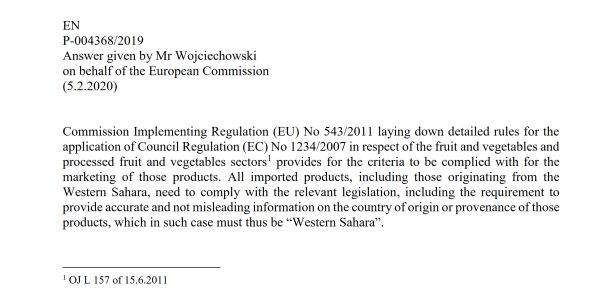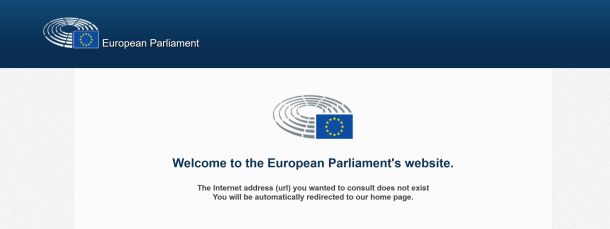
Today, the European Parliament’s agricultural committee issued its opinion that Parliament should refuse its consent to the conclusion of the agricultural agreement with Morocco. “The issue of the Western Sahara territories, with regard to which Parliament's legal services have been asked for an opinion, calls for careful assessment”, states the Committee’s report.
The proposed EU-Morocco agreement concerning reciprocal liberalisation measures on agricultural and fisheries products, will allow Morocco to immediately liberalise 45% of imports from the European Union while the Community will liberalise 55% of its imports from Morocco. The proposed agreement also contains increased concessions in the fruit and vegetable sector, in which Moroccan products account for 80% of the EU's imports.
This agreement, which was signed by the European Member States on 13 December 2010, still requires the European Parliament’s consent. But for months on end, Parliament’s endorsement process has been frozen because of the issue of Western Sahara.
As Western Sahara Resource Watch has noted, the agricultural sector in occupied Western Sahara has grown tremendously in the last few years. Thousands of Moroccan settlers have moved into the territory to work on the rising number of fruit and vegetable plantations. Morocco’s recent agricultural commitment is part of its strategy to settle the Non-Self Governing Territory - or colony - of Western Sahara, largely occupied by Morocco since 1975.
Today, Parliament’s committee for Agriculture and Rural Development decided to issue an opinion, drafted by MEP Lorenzo Fontana, proposing that “Parliament refuse its consent to the conclusion of the agreement”. Read the opinion here.
“The issue of the Western Sahara territories, with regard to which Parliament's legal services have been asked for an opinion, calls for careful assessment. Regardless of whether or not the territories can be included in the agreement, there continues to be a problem with human rights, which are systematically infringed. In order to protect such rights in full, the EU could consider using arguments of an economic and commercial nature, making the signing of such agreements subject to the genuine respect of human rights”, rapporteur Fontana’s report reads.
The Committee also appears receptive of concerns raised by European agricultural associations that the agreement would have “negative economic repercussions on regions which specialise in vegetable cultivation”. Additionally, it has doubts on the sanitary, phytosanitary and environmental differences between the Community and Morocco, and laments the lack of the necessary social and anti-dumping clauses in the agreement’s text.
In 2007, the European Anti-Fraud Office (OLAF) issued a report warning about irregularities in the import tomatoes from Morocco to the Union, indicating fraud by circumventing EU quotas. This potential pitfall has not been addressed by the Commission in the agreement currently under revision.
The part of Western Sahara where the Moroccan tomato industry is taking place is located in a part which Morocco annexed in 1979. “The General Assembly deplores greatly the deterioration of the situation after Western Sahara continues to be occupied by Morocco and that the occupation has been expanded", the UN General Assembly stated regarding that part of Western Sahara.
EU Commission backtracks on labelling Western Sahara goods
What is EU's position on labelling of products from occupied Western Sahara? The EU Commission has now for the third time published a response to a parliamentary question on the matter, but the latest version fails to address the question.
Why does this EU statement keep disappearing?
A clarification by the EU Commission on labelling of products from Western Sahara was published, then removed, then published again and has now been removed again from EU websites.
EU reaffirms: Western Sahara products to be labelled as such
Two weeks ago, the EU Commission announced that products from Western Sahara should be labelled accordingly, only to withdraw that statement the very next day. Today, the Commission reaffirms its original position.
Spectacular backtracking by EU Commission on Western Sahara labelling
On 5 February 2020, the EU Commission announced that products from Western Sahara should be labelled accordingly. But about 24 hours later, all traces to that statement had been removed from EU websites.



